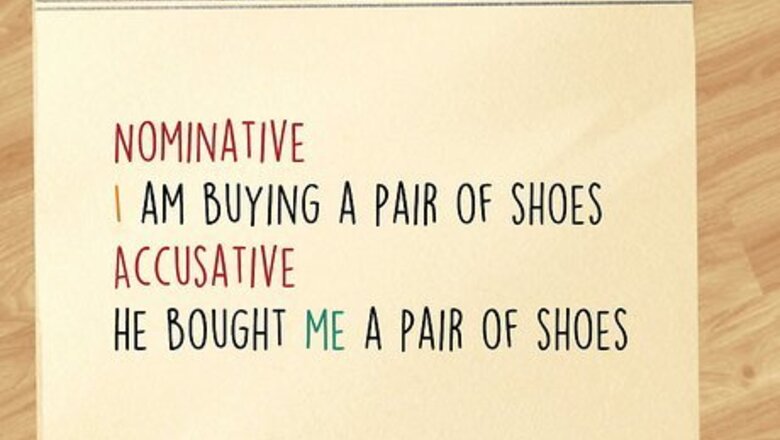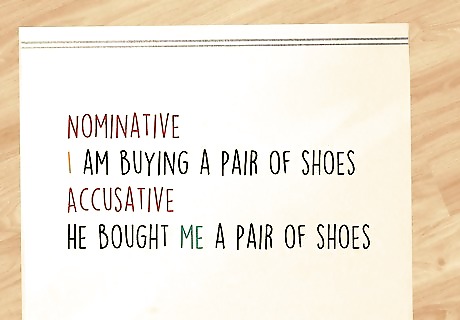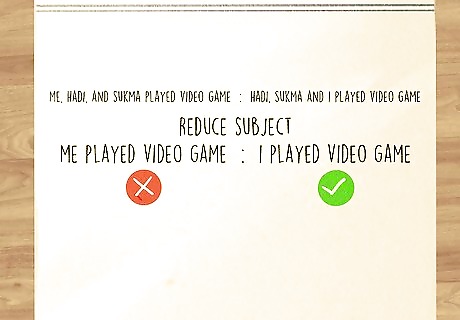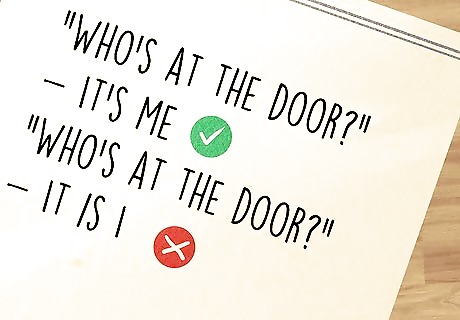
views

Remember the difference in case between the pronouns. Both I and me are pronouns that we use to refer to ourselves, but I is nominative, suitable for use as the subject of a sentence or clause, and me is accusative, suitable for use as the object of a verb. Nominative – The nominative case is used when the pronoun is the subject (e.g. "I rode in the car") or, when speaking very formally, after a form of "to be" (e.g. "It is I," would be formal, "It's me" would be informal). Accusative – The accusative case is used when the pronoun is the object (e.g. "He drove me to work") or with prepositions (e.g. "between you and me," not "between you and I").

Think like a native. Most native speakers rarely make case errors with these pronouns, except when they are paired with other nouns as part of a compound subject or object. (Unfortunately, problems with pronoun case are more common today than twenty years ago.) Although almost no one would say, "Harry took I in his car," one often hears sentences such as "Harry took Jordan and I in his car." If you're trying to determine which pronoun to use in a sentence with a compound subject, try the sentence using only the pronoun part of the subject. Whichever pronoun, I or me, sounds right alone is the one to use in the compound subject

Reduce or simplify the sentence. It can be hard to tell whether to use "I" or "me" in a long, complicated sentence with more than one subject or object. For example, "Me, Hector, and Sam went to the store" doesn't sound to most people all that much better or worse than "Hector, Sam, and I went to the store." Mentally delete all other subjects or objects so that the sentence is reduced to its simplest form, with just "I" or "me" remaining. In this example, you would be left with "Me went to the store" and "I went to the store." Now, it's much easier to see that "I" is correct.

Avoid "Bizarro-speak." In Superman comics, there's an imperfect version of Superman called Bizarro, and he does everything in a backward sort of way. He says, "Goodbye" when he means, "Hello," and he says things such as "Me am so sad to see you" (meaning "I'm glad to see you"). Bizarro, and a little bit of conceit, can help you learn proper pronoun use: If you change the subject around to a different spot in the sentence, and make it about you and only you, you can easily spot the places where the wrong usage of "I" and "me" will make you sound like Bizarro. Examples: "Harry and me went to the store." (Change it around so that Harry's out of the picture and it's just about you - you would never say, "Me went to the store.") "Who's at the door?" You answer, "It's me." (No, no, no! You would really properly say, "It is I." Consider a related sentence: “That writer is me.” Try reversing the word order, and you end up with “Me am that writer.” You use nominative pronouns such as "I" after forms of “to be” (i.e. am, are, is, was, were, be, being, and been). The “to be” functions as an equal sign, so the nouns and pronouns on both sides of the “equal sign” are nominative. "The cake was made by Justin and I." (Would you ever say, "The cake was made by I"?)

Use pronouns correctly in comparisons to prevent ambiguity. Write out the full comparison to decide which pronoun to use. In the following sentence, "I" or "me" may both be correct, but the word you select changes the meaning of the sentence: "She likes Winifred more than I/me." "She likes Winifred more than I" means that "She likes Winifred more than I like Winifred." "She likes Winifred more than me" extends to "She likes Winifred more than she likes me." Writing out the implied words can help you avoid ambiguity and use the correct word in context.



















Comments
0 comment